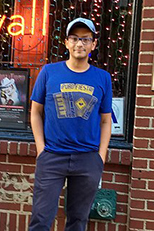Manuel Pichardo Marcano is a PhD student in astronomy at Texas Tech University. Marcano is affiliated with the American Physical Society (APS) and participated in one of Wiki Education’s APS Wiki Scientists courses.

During his Wiki Education course, Marcano focused his attention on various astronomy pages and articles about astronomers and physicists from Latin America. Alternating between the Spanish and English versions of Wikipedia, Marcano was presented with an opportune chance at improving the quality of Spanish language articles within his research interests.
“I started with very small edits on the page of Guillermo Haro and on the page about Pulsars. Also some minor edits to some of the English ones about my research areas,” Marcano says. “I hope to continue improving the pages about my research, especially the Spanish version ones as many lack behind their English counterparts.”
Reach and accessibility on Wikipedia are both important to Marcano, especially for people who use the platform to discover new interests.
“I remember myself as a young boy in the Dominican Republic reading about the many exotic astrophysics objects like black holes and neutron stars and Wikipedia is undoubtedly the first stop for most people to learn about them. It is important that the information on Wikipedia is correct and well-cited, and for this, someone has to write it and contribute to Wikipedia,” Marcano says.
Not only does Wikipedia help curious individuals explore new subject matter, but it can also be personally gratifying for editors such as Marcano.
“The articles are living organisms. Once your edits go live you have to be fine with people viewing it and commenting on it and changing it. I have way too many articles on my watchlist and I love to see the articles change over time and the edits people make,” Marcano says.
While taking the course, Marcano learned the Wikipedia essentials, equipping him with the tools to use Wikipedia in new opportunities going forward.
“I really enjoyed our weekly meetings with Ian and interacting with the rest of the cohort,” Marcano says. “The course was great to learn about all the different parts and pages of Wikipedia, like the talk pages, sandboxes, the Wiki Commons, and the Wiki projects.”
Through APS, Marcano has had more opportunities to keep up with edits and actively engage with the Wiki community.
“I participated in the ‘Women Make the World Go Round: A Pi Day Wiki Edit-a-thon’ to work on biographies of some women physicists. I still need to finish polishing some on my sandbox and I hope to participate in their next Edit-a-thon to get more biographies of underrepresented groups in science. I think that work is necessary and impactful,” Marcano says.
As a researcher, Marcano considered a new perspective for how researchers present their findings to the public. He used this change in perspective to guide his advice for other research scientists who are looking to get involved on Wikipedia.
“We [as researchers] sometimes get lost in the details and lost in jargon. Editing Wikipedia helps you distill your research to put it in an understandable way and see the big picture and connection to other topics,” Marcano says.
With continued interest in editing Wikipedia and impactful contributions to the Spanish language version of the platform, Marcano’s testimonial showcases the extensive possibilities of open-knowledge.
To take a course like the one Manuel took, visit learn.wikiedu.org.
Image of Manuel Credit: Mapichar, CC BY-SA 4.0, via Wikimedia Commons
Hero Image Credit: USDA NRCS Texas, Public domain, via Wikimedia Commons
